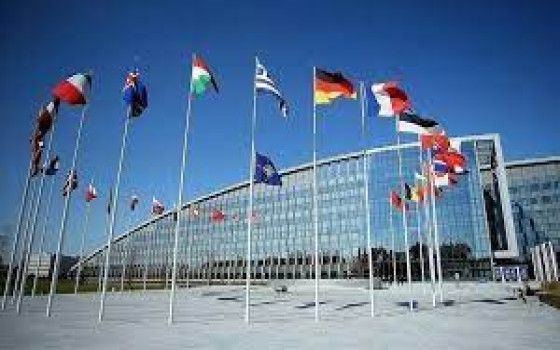
Finland: Russian nuclear threats are behind the decision to join NATO, and Sweden responds to Ankara's request for security coordination before obtaining NATO membership

- Europe and Arabs
- Sunday , 4 December 2022 16:57 PM GMT
Brussels: Europe and the Arabs - agencies
Finnish Foreign Minister Pekka Haavisto confirmed that the nuclear threats looming from Russia are behind his country's decision to join NATO.
Haavisto said in an interview with the Japanese Kyodo News Agency on the sidelines of a meeting of foreign ministers of the Organization for Security and Cooperation in Europe held during the past days in Lodz, Poland, that the Russian intervention in Ukraine raised the levels of security alert in Europe, as the Russian nuclear rhetoric was a major factor in urging Finland to Applying to join NATO, noting that after the Russian intervention, the security situation in Europe has changed.
He added that the nuclear threats to Moscow prompted Finland, which shares a border of about 1,300 km with Russia, to think about how to respond and where to get support if it was exposed to such a matter.
He added that these concerns were among the reasons that prompted Finland to make a historic change in its security policy, especially since it had remained neutral since it lost some of its lands to the Soviet Union during World War II.
He noted that the recent attacks on Ukraine's electricity infrastructure were "extremely cruel" and deprived ordinary people of heating, lighting and sewage systems, demonstrating that Russia is waging "all-out war" against civilians in Ukraine.
In the wake of Russian President Vladimir Putin's decision last September to partially mobilize those with military experience, Haavisto said that his country witnessed a "phenomenon" in which about 40,000 people left Russia via Finland in a matter of weeks, which led to the imposition of restrictions on tourist visas for Russians.
Finland and Sweden applied for membership in NATO after Russia's attack on Ukraine, and abandoned their long-standing policies of military non-alignment.
On the other hand, it seems that Sweden's accession to NATO depends on bowing to the Turkish demand for security cooperation and coordination, according to journalist Noureddine Al-Omrani from the Netherlands, and added, "
The Swedish authorities handed over a Turkish man of Kurdish origin to Ankara, who had previously applied for asylum in 2015. The Turkish authorities consider the person concerned to be a danger because he is a member of the Kurdistan movement that desires independence and thus secession from Turkey in order to establish an independent Kurdistan state. The movement faces accusations of being a “terrorist” that seeks to destabilize the Turkish state.
Handing over the person concerned means that the Swedish government has responded to the Turkish request and thus paved the way for Sweden's accession to NATO after it and Finland had previously submitted its request to join, but the head of the Turkish government, Tayyip Recep Erdogan, refused their request to join, claiming that the two countries harbor "terrorist" organizations, referring to The Kurdish PKK and YPG organizations.
The Swedish authorities handed over the Kurdish man on Saturday to be transferred directly to Istanbul and imprisoned












No Comments Found